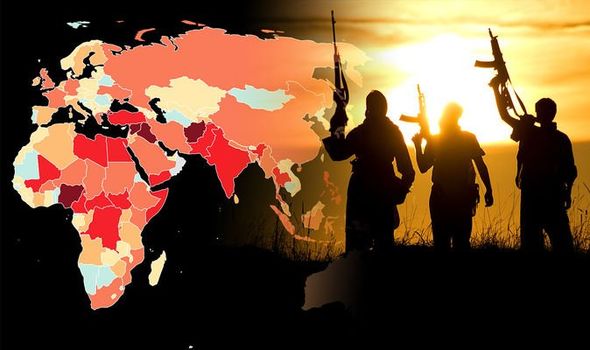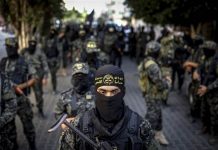This article is written by Shikha Pokhriyal, from Delhi Metropolitan Education, GGSIPU. This article talks about the terrorism and series of terror attacks in India and what laws are in force to combat the same.
Table of Contents
Introduction
Terrorism does not have any specific definition. It can be defined as unlawful use of force and violence against the citizens of a particular area or country. Terrorism is done to fulfill some political and social objectives. It is conducted in various ways. Whatever way it is conducted, terrorism always destroys human life and property. A lot of families get separated and lose their loved ones, and the family never gets to know why this attack took place and why it all happened. Aftermath of terrorism are even worse.
Till now we have witnessed a lot of terror attacks in India, and sometimes the people involved in these kinds of attacks get caught and sometimes never get caught. It is considered one of the most heinous activities in the world. This is because it includes the killing of those people who are innocent and their families never get to know the reason for their demise. Many legal provisions are established to fight off terrorism, still there might be instances of terrorism in the country. Here we will see the few recent terrorism cases that happened in Delhi and all over India, how it was covered and reported and what are the legal trials involved in battle terrorism. Also, we will cover loopholes in our current legal system dealing with the cases of terrorism.
Delhi’s terrorism – a reflection of the events
- Terrorism is an unpredicted attack on the civilians of a country done intentionally to achieve some agenda which can be political, religious, or any other social objective. The word “terrorism” was first introduced at the time of the french revolution in the 18th century and later became an important issue in the United States. India has also observed and survived various terrorist attacks. Many terrorist attacks occurred in India and caused a lot of destruction and destroyed families, properties, and everything.
- Attacks like the Pulwama attack that took place in Jammu and Kashmir on 14th February 2019, where 40 CRPF soldiers were killed, and also in 2016 Uri attack happened in Kashmir where seventeen Indian soldiers lost their lives, then 26/11 Mumbai Attack which is considered as the biggest terrorist attack that took place taking the lives of almost hundred and sixty-six civilians.
- The list goes on, attacks like these not only take away lives and destroy properties but also creates fear among the other people living in the society. Civilians feel unsafe to step out of their houses, there is a feeling which constantly haunts the mind when a person steps out of the house while an attack happens. What if I will never come back home or what if a bomb is planted in the place I am going to? Taking the lives of innocent people just to fulfill some of the objectives is wrong and the worst thing someone can do.
- Several terrorist attacks took place in the capital of the country,i.e., in New Delhi. The first terrorist attack took place in Delhi in 1996 at Lajpat Nagar, central market, where sixteen people lost their lives. In 1997 many bomb blasts took place in Delhi, where many people died. This year can never be forgotten, the first attack took place on 1st October at Sadar Bazar area, where thirty people were declared dead, which was followed by the attack that happened on 10th October, injuring sixteen and killing one, then on 18th October killing one, injuring twenty-three and the last attack of this month was on 30th October in Karol Bagh market.
- After this two more attacks took place, one on November 30th and the second one on 30th December. Many terrorist attacks took place just in a single year and no serious steps were taken! These attacks showed the preparation of the government to protect their citizens and how important it was to prepare and inform the police personnel and citizens of the country of the terrorist attacks.
- Attacks like the bomb blast in Delhi in 2005 caused around sixty-six deaths and two hundred people suffered severe injuries. Most crowded markets and areas were targeted, like Sarojini Nagar, Paharganj, and the Delhi Transport Corporation, Govindpuri. This attack is also considered the biggest terrorist strike and was linked with the terrorist group LET. This terrorist attack took place during the festival of Diwali in 2005 when the markets especially Sarojni Nagar and Paharganj were crowded with customers.
- This attack turned the most prestigious festival celebration into the mourning of loved ones. Everyone was taken aback by the feelings of grief and shock. After the attacks of 1997, 2005 terrorist attacks shocked the entire nation and was the wake-up call for the authorities to do something about these bomb blasts to save the lives of innocent people.
- Delhi witnessed another attack in 2001, which is known as the Indian Parliament attack. This attack took place outside Delhi High court, which caused an enormous amount of deaths and injuries. This attack happened when the Lok Sabha session was going on. This attack was conducted by the suicide squad comprising five members and two of them were Lashkar-e-Taiba and Jaish-e-Mohammad.
- Many leaders claimed that the members of these groups were associated with two organizations that are supported by the Pakistan ISI. Though within a few days, all the members were arrested by the police, the legal case against them went on for many years. The Supreme Court acquitted the two of the members and declared death sentences for the rest two.
After this terrorist attack, the Indian Government passed an ordinance namely The Prevention of Terrorism Act (POTA) on 26th March 2002.
Series of trials involving Delhi terrorism
As mentioned above, many terrorist attacks took place in our national capital, New Delhi. Major bomb blast in 2001 known as Parliament Bomb blast, the accused of this blast are still in custody and the case is still pending in the court. In 2005 then the several bomb blasts in the most crowded Markets Paharganj, Sarojini Nagar, and Delhi Transport Corporation, Govindpuri still considered as the most heartbreaking attacks that ever happened.
The recent attack was outside near the Israeli embassy in New Delhi, India, on January 29, 2021. Outside the Israeli embassy, a small bomb was exploded destroying the nearby cars and no injuries were reported. The authorities on the case said that the attack was not a very major attack but a very low-intensity attack. The matter is under investigation and is being investigated by the National Investigation Agency(NIA) and the Delhi Police Cell.
The role of law in the series of trials
Terrorist attacks have affected India immensely. Many reasons have contributed to terrorism, like religion or unemployment. Many legal provisions were introduced to combat the problem of terrorism in India to deal with the situation accordingly. Right now, India has two laws to tackle the situation of terrorism.
In 1967, The Unlawful Activities Prevention Act was introduced to combat terrorist activities. This Act was established to deal with the specific unlawful or illegal activities, of an individual or the association dealing in the terrorist activities or activities which are connected to terrorism. Unlawful activity can refer to the activities that can cause harm or violate the territorial integrity or sovereignty of India. According to this Act, the Union Government can designate someone as participating in terrorism if they are preparing for terrorism, promotes terrorism, or are involved in any way in activities of terrorism. This Act was first amended in the year 2004 and then was re-introduced in 2019.
The second important Act to combat this crime, came into force in the year 1987 Terrorist and Disruptive Activities (Prevention) Act, 1985 (TADA). This Act remained in effect till the year 1995. This legal Act was implemented against the Khalistan movement and the Bombay bomb blast. The constitutional validity of this Act was questioned. In the case of Kartar Singh vs State of Punjab (1994), the court upheld the constitutionality of the terrorist and disruptive activities act.
Then in the year 1999, The Maharashtra Control of Organised Act (MCOCA) was introduced to deal with the rising crimes in Maharashtra and Mumbai due to the Underworld. Organized crimes can be referred to as terrorism, theft, prostitution, robbery, drug trafficking, crimes that are committed in a group. This Act was initially applicable to the State of Maharashtra but after the amendment which was done in the year 2002, it was also applied to the National Capital Territory of Delhi.
In 2002, the Prevention of Terrorism Act came into force. This Act was established after the 2001 Parliament bomb blast. Terrorist activities were continuously increasing in India so to strengthen anti-terrorism law, this law was formed. This Act was considered as the best remedy to deal with terrorism by some political parties. This Act defined terrorism and permitted an investigation of any suspect in case of suspicion. In Code of Criminal Procedure, 1973, under Section 161, confession given to police cannot be used as evidence in the court of law, but under the Prevention of Terrorism Act, confessions made to police can be used in court. This Act was revoked in 2004 when a massive number of complaints were filed stating that in the name of investigation minorities were being abused. These provisions are used by political parties to win the rivalry between the parties.
So the only law that prevails in India against terrorism is the Unlawful Activities (Prevention) Act 1967 (UAPA), originally it only aimed at specific unlawful activities. This Act was first amended in 2004 where the definition of unlawful acts was expanded to include ‘terrorist acts’ and ‘terrorist organization’. The second amendment was passed in the year 2008, in this, some legal provisions of POTA and TADA were adopted. Then in 2012, it was amended again, including offenses that threaten the country’s economic security into the definition of terrorist acts. In 2019, another amendment was passed where the Central Government has the power to designate a person as a terrorist and has a right to seize his or her properties. Also, special procedures were introduced to deal with terrorist groups.
The loophole in the legal system to successfully deal with the terrorism
Though many provisions were introduced to battle the problem of terrorism still there is a need for a more strict law to tackle all the activities of terrorism. This law which is enacted in India frequently targets the people of some communities due to some religious or political agendas. In this rivalry between the political parties, the Government does not focus on people who are the culprit and kill innocent people. And when these terrorist attacks happen then some amendments or new laws are passed.
In this, there is a need to make everyone aware of terrorism. So that many lives can be saved. There is a need to train police personnel to identify terrorist activities. In the past years, many laws were enacted, but after a while, they were repealed because of several reasons. Most common among them is that minorities were being harmed and they were tortured under the names of these laws, and the fundamental rights of these miniatures or groups of people were being violated. Anti-terrorism laws are made to decrease these terrorist activities to protect the civilians and give punishments to the terrorists but after many terrorism laws like Prevention from Terrorism Activities Act, 2002, terrorist activities were increased in India.
These anti-terrorism laws mostly failed to give punishments to culprits involved in the major bomb blasts. The cases against these culprits stay pending in the court due to some technical problems. Like in the case of Afzal Guru, an accused in the case of Parliament bomb blast 2001, was sentenced to the death penalty but his application somehow is still pending to get approval from the President due to some problems. Due to some loopholes or technical problems these people who attack and take so many lives somehow manage to live.
Conclusion
There is a need to make more strict anti-terrorism laws to defend the country. The primary objective of these laws should be to protect the lives of the citizens and they should be used to target communities that are vulnerable to fulfill some political, religious, or social objective. It is high time now that legislation executes and implements anti-terrorism laws by keeping few past mistakes in mind. Terrorism is an activity that causes fear and destruction. The courts should not further delay the proceedings of accused who were involved in major bomb blasts and strong judgments should be given against them. This will set an example and in the future, a person or an association will think twice before killing innocent people just to fulfill their objectives. It is never okay to take so many lives because a certain group of people thinks they are doing it for the best or it will be delivered as a message.
There is a need to inform the civilians about all these activities which can be harmful and illegal so that they can also help the authorities. Police personnel should be trained to tackle situations in crowded areas. Terrorists always target innocent people to take what they want. When this happens thousands of lives come at stake. So it’s time to take this matter more seriously so that the destruction of human lives and property can be prevented.
References
- https://www.oneindia.com/2011/09/07/bomb-blasts-terror-attacks-in-delhi.html?story=3
- https://www.mha.gov.in/sites/default/files/A1967-37.pdf
LawSikho has created a telegram group for exchanging legal knowledge, referrals, and various opportunities. You can click on this link and join:
 Serato DJ Crack 2025Serato DJ PRO Crack
Serato DJ Crack 2025Serato DJ PRO Crack











 Allow notifications
Allow notifications


